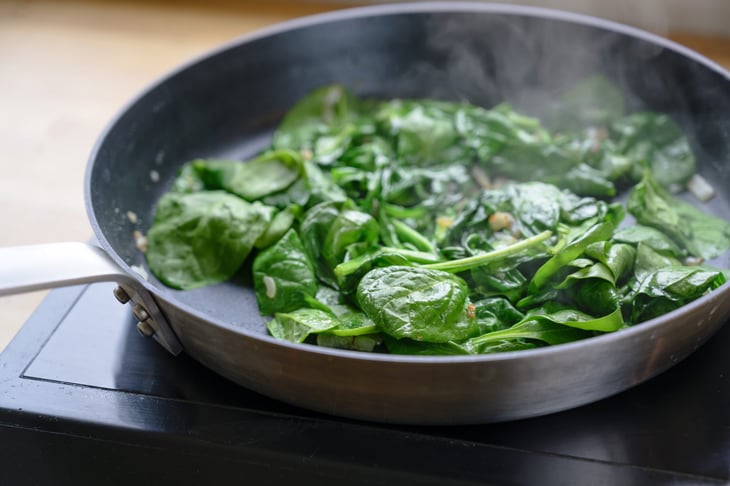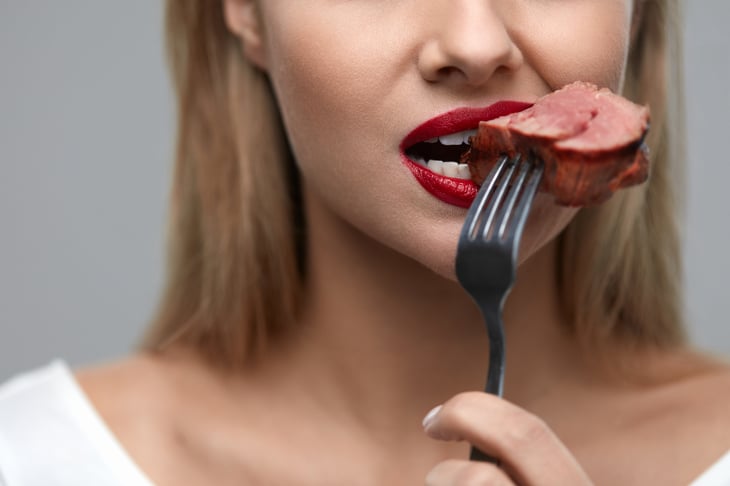
Your skin is the largest organ in the body. Skin even has its own microbiome and its own metabolism. In fact, skin’s metabolism is responsible for the production and breakdown of collagen and elastin — the components that keep skin looking youthful. A healthy skin metabolism also means healthy cell turnover so skin can properly repair and heal itself. If you’ve ever waited for a sunburn to peel away, you were waiting on skin cell turnover.
Unfortunately, skin’s metabolism — or the rate at which it can renew cells — naturally slows down with age. These metabolic processes are also interrupted when skin is exposed to environmental factors like ultraviolet (UV) radiation, smoke or other air pollutants. Some of these factors you can control while others are out of your hands.
Certainly, treating damaged skin with sunscreen, serums and moisturizers is beneficial. But did you know you can also take care of your skin from the inside out?
It’s true. Certain nutrients are known for supporting collagen production, cell turnover and skin elasticity. Some nutrients even act like sunscreen, protecting skin from those harmful UV rays. What are these miracle nutrients? We’ve rounded up a list to guide you in the right direction. All you have to do, now, is make sure you’re eating enough of the foods that supply these nutrients.
1. Protein

All proteins are made up of various amino acids. Some of those amino acids are necessary for certain aspects of skin health.
For instance, lysine is an amino acid involved in the formation of collagen. Collagen is responsible for maintaining the structure and shape of skin. Phenylalanine is another amino acid, and its skin superpower is absorbing UV radiation. Other amino acids, like leucine and arginine, are needed for wound healing.
To get these skin-nourishing amino acids in your diet, you must simply eat more protein foods. Animal-based protein foods are the best sources. These include meat, dairy, chicken, fish and eggs. Phenylalanine, lysine and leucine are also abundantly found in soybeans, peanuts and lentils if you prefer plants.
2. Collagen

If protein is beneficial for skin health, does that mean collagen protein is, too? Yes, collagen is one of the most abundant proteins in the body so naturally it supports the largest organ in the body.
Oral collagen supplements contain the amino acids glycine, proline and a precursor to proline called hydroxyproline. These are non-essential amino acids, meaning your body makes enough of them on its own. Nonetheless, they are necessary for stimulating wound healing. Researchers have also discovered that collagen supplementation can improve skin elasticity, hydration and wrinkling. For those concerned about the effects of aging, collagen protein powder is a perfectly safe and effective investment.
When choosing a collagen powder, you may want to choose a marine-based collagen. These products have low molecular weight collagen peptides (LMWCP), which have been shown repeatedly to support the youthful look of skin. In one study, women 40-60 years old taking 1,000 mg of oral LMWCP daily had significantly greater skin hydration after just six weeks and improved skin wrinkling and elasticity after 12 weeks.
No matter what, make sure your collagen powder is hydrolyzed, as this increases the absorption rate and bioavailability of the amino acids.
3. Vitamin A

This fat-soluble vitamin comes in many forms. The two main dietary forms of vitamin A are preformed vitamin A (retinol and retinyl esters) and provitamin A (carotenoids).
Retinol has long been used in skincare products to help fight the effects of aging, but topical creams aren’t the only way to reap the benefits. Several randomized controlled trials have shown that consuming fruits and vegetables rich in carotenoids protects skin against the sun’s harmful UVA and UVB rays. Carotenoids have also been shown to increase skin elasticity and firmness. In a small study of women ages 27 to 73, consuming one carotenoid-rich avocado daily for eight weeks resulted in “a significant increase in forehead skin firmness.”
While avocados may be a good source of carotenoids, carrots, sweet potatoes and pumpkin have the highest concentrations of this skin-healthy nutrient. To increase your intake of preformed vitamin A, like retinol, eat more dairy products, eggs, fish and organ meats.
4. Vitamin C

Do you take vitamin C when you’re feeling sick? This nutrient has long been known for supporting immune health, but one of its biggest roles in the body is providing antioxidant protection.
As an antioxidant, vitamin C protects against free radical damage, like the kind caused by UV exposure. In fact, UV light decreases the vitamin C content of skin, which makes it even more important to replenish what’s lost. Vitamin C also helps regulate collagen production, which explains why vitamin C may be beneficial for smoothing skin wrinkles and healing wounds.
The good news is vitamin C is found in a number of fruits and vegetables, including citrus fruits, strawberries, bell peppers, broccoli and even potatoes. The RDA of vitamin C is 75 milligrams for adult women and 90 milligrams for men. While this is a water-soluble vitamin and your body will excrete any excess, it’s still best to stay under the upper limit of 2,000 milligrams per day. Too much vitamin C can cause an upset stomach or, worse, kidney problems.
5. Vitamin E

In terms of skin health, vitamin E’s biggest asset is antioxidant protection. As an antioxidant, vitamin E helps protect skin cells from sun damage.
Antioxidant activity, along with the ability to alter gene expression, is the reason vitamin E is included in oral therapies to treat pressure ulcers and burns. These effects are even greater when vitamin E is combined with vitamin C and zinc. This powerful combination of nutrients has shown to enhance antioxidant protection and reduce the time needed for a wound to heal.
Vitamin E is synthesized by plants, which means plants are the richest sources of vitamin E. Notable foods include sunflower seeds, corn oil, spinach and whole grains. If choosing a supplement form, make sure it features vitamin C and zinc.
6. Vitamin D

Skin is your first line of defense against certain pathogens. Think of your skin as a physical barrier, or a protective coat, that covers your entire body. Therefore, healthy skin means a healthy immune system. What does this have to do with vitamin D? Vitamin D is essential in forming the skin’s epidermal barrier.
Vitamin D also helps provide the energy needed to support DNA repair in skin after exposure to UV rays. In one randomized controlled trial, participants were given either a placebo or a high dose of vitamin D3 (cholecalciferol) after an experimental-induced sunburn. Skin biopsies 48 hours later showed the vitamin D group had less skin redness and lower markers of inflammation.
The downside is vitamin D is not a natural component of many foods. Fatty fish, egg yolks and cheese are the main dietary sources of vitamin D3, but their supply is highly variable. If you’re concerned about your vitamin D levels, consider adding a bowl of cereal to your daily routine. In the U.S., milk and ready-to-eat cereals are fortified with vitamin D. Just one cup of milk supplies about 3 micrograms (120 IU) of vitamin D3. Don’t worry, plant-based eaters. Milk alternatives are also fortified with the same amount of vitamin D.
7. Water

It should come as no surprise that adding water to your diet can substantially improve skin hydration. Interestingly, the effects are most prominent in people who don’t drink enough water every day or who have dry skin. Water also flushes out toxins and waste. By maintaining adequate hydration and getting rid of toxins, water helps the skin properly perform its normal daily functions.
Not to mention, dry skin can lead to an overproduction of sebum to compensate for the lack of moisture. An increase sebum means oily skin and, consequently, unsightly acne. On the other hand, well-hydrated skin leads to the appearance of smoother, softer skin.
So how much water do you need? The U.S. National Academies of Sciences, Engineering, and Medicine have determined that the total amount of water you need per day is about 124 ounces for adult men and 92 ounces for adult women. These recommendations include water from food and beverages combined. Since about 20% of your water intake comes from food, women should aim to drink 72 ounces (9 cups) of pure water and men should shoot for at least 104 ounces (13 cups) each day.
8. Zinc

Zinc supports skin health in two ways: 1) by promoting wound healing and 2) by helping the body absorb vitamin A. Therefore, a zinc deficiency will also affect your vitamin A levels.
The good news is the average American diet provides 10 to 15 milligrams of zinc per day, which is within the Recommended Daily Allowance (RDA) for adult men and women. Not a meat eater? Beans, peanuts and whole grains are also good sources of zinc.





Add a Comment
Our Policy: We welcome relevant and respectful comments in order to foster healthy and informative discussions. All other comments may be removed. Comments with links are automatically held for moderation.